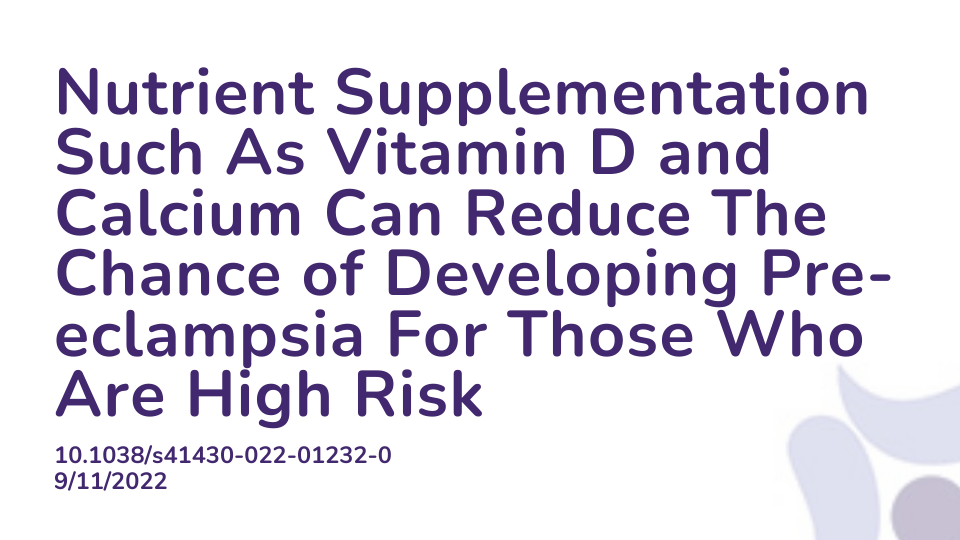Summary:
Pre-eclampsia is a dangerous pregnancy condition that is distinguished as high blood pressure after 20 weeks of gestation with other possible complications such as placental dysfunction. Pre-eclampsia is associated with a high risk of maternal death. This systematic review aimed to examine the effect of supplementing micronutrients such as calcium, vitamin E, D + C, magnesium and folic acid in women identified as having a greater risk of developing pre-eclampsia. A summary of twenty papers showed that there is a lower rate of pre-eclampsia amongst individuals who supplemented with calcium and vitamin D, however the studies included in this systematic review have limitations due to small sample sizes and variation amongst results. Previous literature has shown that calcium supplementation can reduce the risk of pre-eclampsia and that it’s most effective in women with low calcium diets, so the results of this review are consistent with the current research so far. The mechanism of action is thought to be that calcium has the ability to lower blood pressure. The results of previous literature and the findings from this review support the use of calcium for women at risk of pre-eclampsia, particularly in women with low dietary intake.
Abstract:
Background: Pre-eclampsia can lead to maternal and neonatal complications and is a common cause of maternal mortality worldwide. This review has examined the effect of micronutrient supplementation interventions in women identified as having a greater risk of developing pre-eclampsia. Methods: A systematic review was performed using the PRISMA guidelines. The electronic databases MEDLINE, EMBASE and the Cochrane Central Register of Controlled trials were searched for relevant literature and eligible studies identified according to a pre-specified criteria. A meta-analysis of randomised controlled trials (RCTs) was conducted to examine the effect of micronutrient supplementation on pre-eclampsia in high-risk women. Results: Twenty RCTs were identified and supplementation included vitamin C and E (n = 7), calcium (n = 5), vitamin D (n = 3), folic acid (n = 2), magnesium (n = 1) and multiple micronutrients (n = 2). Sample size and recruitment time point varied across studies and a variety of predictive factors were used to identify participants, with a previous history of pre-eclampsia being the most common. No studies utilised a validated prediction model. There was a reduction in pre-eclampsia with calcium (risk difference, −0.15 (−0.27, −0.03, I2 = 83.4%)), and vitamin D (risk difference, −0.09 (−0.17, −0.02, I2 = 0.0%)) supplementation. Conclusion: Our findings show a lower rate of pre-eclampsia with calcium and vitamin D, however, conclusions were limited by small sample sizes, methodological variability and heterogeneity between studies. Further higher quality, large-scale RCTs of calcium and vitamin D are warranted. Exploration of interventions at different time points before and during pregnancy as well as those which utilise prediction modelling methodology, would provide greater insight into the efficacy of micronutrient supplementation intervention in the prevention of pre-eclampsia in high-risk women.
Article Publication Date: 9/11/2022
DOI: 10.1038/s41430-022-01232-0



